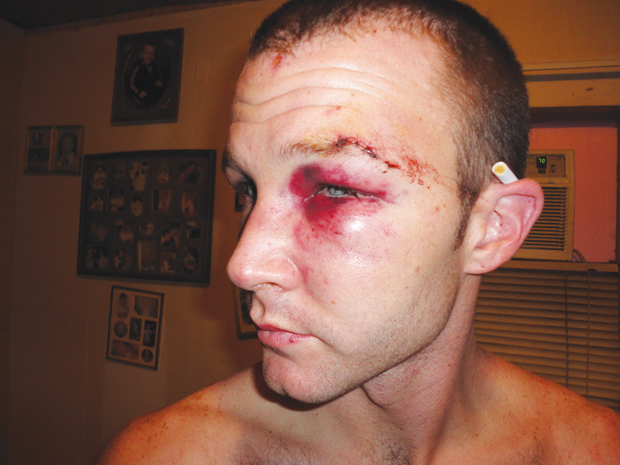
BEATEN AND BURNED | Burke Burnett was stabbed with a broken beer bottle and thrown onto a lit burn barrel at a Halloween party in East Texas. (Courtesy of Burke Burnett)
No. 9
Burke Burnett says he was inspired to come out as gay at 15 after learning about the hate crime murder of gay Wyoming college student Matthew Shepard. Thirteen years after Shepard’s death, Burnett himself became the victim of a brutal anti-gay hate crime in Reno, Texas, a small town east of Paris and 100 miles northeast of Dallas.
Burnett, now 26, was at a Halloween party in the early morning hours of Oct. 30 when he was jumped by three men who yelled anti-gay epithets as they stabbed him repeatedly with a broken beer bottle, before throwing him onto a lit burn barrel.
Burnett said he’d never before had problems in his hometown due to his sexual orientation, but he believes the men were trying to kill him.
It took 30 stitches to close stab wounds to his back and forearm, as well as a cut above his left eye. He also sustained second-degree burns and severe bruises.
It was arguably the worst anti-gay hate crime Texas has seen since Jimmy Lee Dean was beaten nearly to death in the heart of Dallas’ gay entertainment district in 2008. And for many in East Texas, Burnett’s beating undoubtedly evoked memories of the 1993 murder of Nicholas West in Tyler.
Fearing that local authorities wouldn’t treat the crime seriously, Burnett’s friends contacted the media. After graphic photos of his injuries were posted on DallasVoice.com, the incident quickly made national news.
Reno police were tightlipped about their investigation, but within days they’d arrested three men in connection with the crime — 31-year-old James Mitchell Lasater III of Paris, 25-year-old Micky Joe Smith of Brookston and 33-year-old Daniel Shawn Martin of Paris.
The suspects each were charged with multiple counts of aggravated assault, but under Texas law, it would be up to prosecutors to decide whether to treat the case as a hate crime.
And LGBT advocates weren’t terribly optimistic, given that in the 10 years since Texas’ statute was passed, only about a dozen cases have been prosecuted as hate crimes.
They would be pleasantly surprised, however, when on Nov. 10 the Lamar County District Attorney’s Office announced that that all three suspects would face hate crimes enhancements.
Aggravated assault is a second-degree felony punishable by up to 20 years in prison, but the enhancements would bump up the charges, making them first-degree felonies punishable by life in prison.
— John Wright
This article appeared in the Dallas Voice print edition December 30, 2011.













